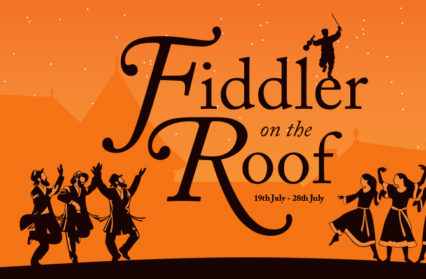Thomas Tyrrell gives his review of the new production of Fiddler on the Roof at Cardiff’s Everyman Theatre.
The synagogue on Cardiff’s Cathedral Road was founded in 1897, on land donated by the third Marquess of Bute. It represented a high-water mark for the Jewish community in Cardiff, but as their numbers steadily declined or moved to outlying suburbs, the synagogue fell into disuse, and finally closing in 1989. It now forms a more than usually ornate frontage to the usual office block, another reminder of Cardiff’s Jewish history and vibrant Victorian past.
Meanwhile, a few hundred metres away on a marquee stage in Sophia Gardens, Cardiff’s Everyman Theatre are following up their excellent production of Merchant of Venice with one of the great Broadway musicals of Jewish culture, historical change, and of course, Tradition!
Based on the Tevye the Dairyman short stories by the Yiddish writer Sholem Aliechem, Fiddler on the Roof first hit Broadway in 1964, and went on to break the then-record for the longest running musical. The film version of 1971 beat action films like The French Connection, Diamonds are Forever and Dirty Harry to gain the title of highest grossing film that year, in a decade where conventional wisdom said the heyday of the film musical was over. It’s continued to be revived since, including a celebrated UK performance with the Anglo-Iranian comedian Omid Djalili in the lead role.
The Everyman production is simply staged, and at times the village of Anatevka looks more like a garden centre than a shtetl, but the show makes the most of its vast cast from the opening number onwards. It’s a pleasure to have so many voices and faces: sixty actors are listed in the program, and if there’s a certain amount of fun to be had spotting the false beards on the faces of its not-notably-Jewish cast (there were at least two), the Eastern European accents stay solidly in place throughout. Most impressive is the choreography, which makes an impression in any number of set-pieces. The Cossack dancing in “Drink, Lechaim, to Life” makes a strong impression, but it’s the famous wedding scene that’s most impressive. Occasionally these group scenes make the stage feel a little crowded, but by and large it cuts just the right line between chaos and choreography, as dancers balance bottles on their heads and the radical student Perchik introduces the Polka to a scandalised village.
Paul Williams gives a charismatic performance in the lead role of Tevye, the milkman blessed or cursed with five daughters, and he engages the audience from the moment he drags his milk-cart on stage and starts to berate God for laming his horse on the day before the Sabbath. He has excellent chemistry with Jo Herco-Thomas, who plays his wife Golde with great charm and sympathy, in a role that could too easily be a shrew-like stereotype. Their scenes and songs together are uniformly excellent, from the touching pathos of “Do I love you?” and “Sunrise, Sunset” to the madcap Gothic whirlwind of “Tevye’s Dream”,which is a riot of hand-puppets, shrieking and billowing gauze.
The darker element of the musical gathers force from the end of the first half, where the wedding of Tevye’s daughter Tzeitel is broken up by a minor pogrom. Where the first half saw Tevye’s daughters winning him over in their various breaks from tradition, the second half sees his third daughter Chava cross a line he cannot condone. When she elopes to marry outside the faith, she is banished from the family and treated as if she were dead. After the Russian authorities give the Jewish population three days to leave the village, Tevye and his community must abandon their homes and traditions for a new life in America. This growing darkness in the plot is well paralleled by the slow falling of dusk over the outdoor theatre. When the actors leave the stage for the final time, darkness falls across the set, and the sound of the wind rises amongst the abandoned buildings. While the staging of this musical was perhaps at times a little too traditional, coasting through on fond memories of the film, this sudden bleakness, with all humanity fled, gives us a useful moment to consider the relationship between this classic musical and the new stories, too common in the past century, of state violence, displacement, and forced migration.
Fiddler on the Roof is on at Cardiff’s Everyman Theatre until July 28th.
Thomas Tyrrell has a PhD in English Literature from Cardiff University and is a regular contributor to Wales Arts Review.












